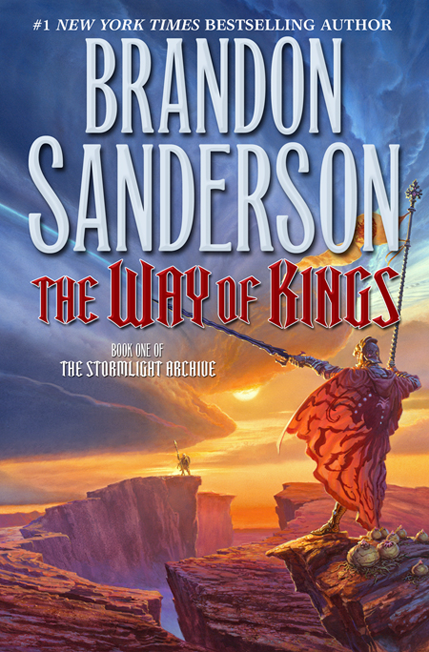I read 192 books this year and came up with 17 favorite books. Looking at my list, I noticed my biggest weakness: nonfiction. I didn't read a single nonfiction book this year! (Apart from school textbooks, which don't count.) Something definitely needs to be done about that.
Anyway, here they are, in roughly the order I read them in:
The Way of Kings by Brandon Sanderson: I just finished this the day before yesterday, and while I usually let a little time elapse before deciding if something's my favorite or not, this is a clear winner. Sanderson creates an incredibly imaginative world, then works through the consequences of that world. His characters always seem like flesh-and-blood human beings who are just trying to make sense of the world and how to act. A full review is upcoming.
The Haunting of Hill House by Shirley Jackson: Shirley Jackson is a master. Sometimes I would find myself re-reading passages just to look at the way she crafted her sentences. Brilliantly atmospheric and even warm and funny at times, this was a less of story of things that go bump in the night than of how people manipulate and use each other. I read this about a week ago and haven't gotten to the review yet; the holidays are really messing up my schedule.
Bel Canto by Ann Patchett: This book is so sweet and funny and tragic. If I were to pick one word to describe it, it would be “subtle.”
The Satanic Verses by Salman Rushdie: I read this book for a class and found myself unable to put it down. It is about the narratives we craft: narratives about mythology, about good vs. evil, and about identity; and how real life is so much messier. Also, it's narrated by the devil, which is just cool.
Meridian by Alice Walker: Another book from school. Meridian is such a complex character. Sometimes I loved her, sometimes I hated her, but I always enjoyed reading about her. This book is about race, gender, and the 1960's, but mostly it's about a very singular woman.
The Likeness by Tana French: It was a toss-up between this and In the Woods. I liked the tone of The Likeness more. The casual banter-y way a group of friends interact is paired with the tension that one of them is a murderer.
I'd Know You Anywhere by Laura Lippman: This book, about the only living victim of a serial killer, was about surviving. It never settles for easy answers and never exploits the events for melodrama.
White Teeth by Zadie Smith: A family saga that spans only two generations but still manages to feel sprawling, this novel is about family, identity, and what it means to be an immigrant. Zadie Smith tells you exactly what you need to know and no more.
Case Histories by Kate Atkinson: This mystery links three tragedies, all concerning women, to create a complex, philosophical novel about violence, victimization, and love.
The Gone-Away World by Nick Harkaway: A story of what happens after reality collapses. It's a novel about war, corporation morality, and how human beings survive and adapt; and it's told by one of the most unreliable narrators I have come across.
The Many Deaths of the Firefly Brothers by Thomas Mullen: What do you do if you're an outlaw who just came back from the dead? Mullen captures the despair and resilience of America in the Great Depression while we follow the Firefly brothers through flashbacks and their many deaths.
The Hundred Thousand Kingdoms by N. K. Jemison: A fantasy about what happens if gods really walked amongst us, this book is also a romance and coming-of-age story about a young woman thrust into power.
Turn of the Screw by Henry James: A simple, eerie story about a woman who starts seeing ghosts.
(Or does she?) It brings up issues of hysteria, madness, and the maternal instinct. And it's a damn good ghost story.
Castle Waiting by Linda Medley: I found this graphic novel in my library almost by accident and fell in love. It's a fairy tale about a castle refuge for anyone in need, and it's the stories those residents tell to each other.
Anna Karenina by Leo Tolstoy: It's a classic for a reason. We follow the characters Anna and Levin as they try to determine what is right and how far they will go to be happy. I'm definitely reading more Tolstoy after this.
Monsters of Men by Patrick Ness: A wonderful end to an astounding series. Everyone else has pretty much said all there is to say—and said it better--so I'll just say I loved it.
The Year of the Flood by Margaret Atwood: A companion to the wonderful Oryx and Crake, this book tells about two women who survive the catastrophic events in Crake. It's about the intersection of science and religion and the way women find a place in a new society.
Honorable Mentions: Blackout by Connie Willis (Only because I haven't read All Clear yet and don't feel like I can judge one without the other.), The God of Small Things by Anita Desai, The Millstone by Margaret Drabble, The Big Sleep by Raymond Chandler
 Man, I really wish I'd read this later, so that I could read the next books in the series. It doesn't end precisely with a cliffhanger, but it's definitely a “to be continued.”
Man, I really wish I'd read this later, so that I could read the next books in the series. It doesn't end precisely with a cliffhanger, but it's definitely a “to be continued.” 


